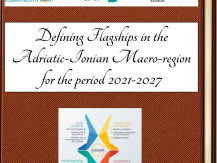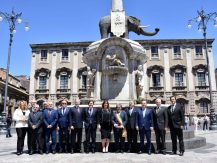Greece’s EUSAIR Presidency Prioritizes EU Enlargement, Environmental Protection, and Economic Cohesion
Greece assumed the presidency from Croatia this summer, presenting its priorities on Corfu, an Ionian island, to representatives from EU members Croatia, Italy, and Slovenia, as well as non-EU members Bosnia and Herzegovina, Serbia, Montenegro, North Macedonia, Albania, and San Marino.
During the kickoff of its presidency of the EU Strategy for the Adriatic and Ionian Region (EUSAIR), the Hellenic Republic outlined its priorities for the coming year, with a focus on supporting Western Balkan EU membership, protecting the marine environment, advancing green technologies, strengthening maritime affairs, and advocating for broader EU engagement. Greece emphasized the importance of regional collaboration on key issues like energy, climate change, marine pollution, and demographic challenges, especially in the wake of recent crises.
Key Priorities of the Greek Presidency:
- Supporting EU Enlargement in the Western Balkans:
Greece aims to advance EU integration for the Western Balkans by aligning EUSAIR projects with the EU’s Enlargement Methodology and the Economic and Investment Plan for the region. This involves using EUSAIR's Thematic Steering Groups to transfer technical know-how to candidate countries and aligning flagship projects with the EU accession process, strengthening cooperation and visibility for both candidate countries and EU services. - Post-2027 Cohesion Policy and EUSAIR Linkages:
Greece seeks to strengthen EUSAIR's role in post-2027 EU Cohesion Policy, promoting regional cooperation, resilience to crises, and sustainable development. Recognizing the expected increase to 30+ EU members, Greece will advocate for policies that support equitable regional development and reduce disparities. The "think locally, plan macro-regionally, act Europeanly" approach underpins Greece’s aim to foster a place-based strategy for addressing regional challenges within EUSAIR. - Green Transition and Climate Change Response:
Greece will accelerate efforts toward a green transition, particularly important in the Mediterranean climate "hotspot." Greece promotes cross-border energy initiatives, with a focus on offshore renewable energy, hydrogen development, and enhanced energy interconnections. By highlighting projects such as hydrogen valleys and Projects of Common Interest, Greece aims to ensure that the region moves collectively toward climate neutrality by 2050, enhancing regional energy security and sustainable resource management. - Blue Economy and Development of Maritime Skills ("Blue Skills"):
Greece prioritizes maritime safety and security within EUSAIR’s blue economy, emphasizing the importance of skill-building in coastal communities to foster job creation, economic growth, and sustainability. As a coordinator for the blue economy pillar, Greece, together with Montenegro, will focus on sustainable management of marine resources, promoting innovative technologies, and supporting the cultural and economic traditions of coastal communities. - Environmental Protection and Marine Conservation:
Greece is committed to expanding marine conservation efforts, announcing the creation of two new marine parks in the Aegean and Ionian Seas, aiming to increase Greece's protected marine areas to 32% by 2024. Actions will include banning trawling in marine parks by 2026, enhancing monitoring and surveillance of protected areas, and working with EUSAIR members to reduce plastic waste by 50% and microplastics by 30% by 2030.
A revised action plan is expected by the end of the year, making the EUSAIR’s objectives more concrete and adding a new “Social Pillar” proposed by Croatia. This pillar, alongside the existing focuses on marine, tourism, environment, and connectivity, emphasizes youth welfare, demographic challenges, and labor market issues. Greece will work to implement this pillar, bringing these priorities to the forefront through cross-border projects financed by EU funds.
Watch the highlights video from the Kick off Event.
You might be interested in

EUSAIR flagships all summed up!

The Hellenic Republic assumes the Presidency of the EU Strategy for the Adriatic and Ionian Region (EUSAIR) (1 June 2024 – 31 May 2025)

3rd EUSAIR Annual Forum – CATANIA DECLARATION







